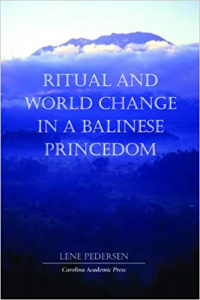Ritual and World Change in a Balinese Princedom
- Title
- Ritual and World Change in a Balinese Princedom
- Original language
- Author(s)
- Illustrator(s)
- Publisher
- Carolina Academic Press
- ISBN
- 978-1594600227
- Publication date
- 2005
- Subjects
- ethnography
- history
- culture
- Find Book
- Amazon
- Related Env. Initiatives
- Related Places
- Related Biographies
- Related Children's Books
- Related Holidays
- Related Folktales
- Related Comics
- Related Lontar
- Linked words
Description(s)
Ritual and World Change in a Balinese Princedom is an ethnography of a contemporary Balinese princedom as it engages with globally influenced circumstances. A ritual of ancestral deification serves as a vehicle for talking about the Balinese negara (or state), power, subject formation, and local approaches to the changing nation-state. The stage is set in chapter one with a narrative of the large-scale ritual performed by a minor noble house in the highlands of eastern Bali, presented as it unfolds in counterpoint with the national political upheaval surrounding President Suharto's fall from power in 1998. Through the lens of the ritual, the deliberate reconstitution of ancient forms of caste hierarchy can be observed Pedersen then looks more closely at the ritual s political dimensions, and at how and why the various participants became involved. Two discourses join in a surprising way, as questions posed about modern politics and the broader meaning of the ritual lead back to issues debated at the level of the nature of the Balinese state. In the modern era, where the princedom lacks obvious forms of power to coerce, the question that rises to the fore is, Why do the subjects still follow and work for the princes? This question recurs as subsequent chapters investigate what the ritual reveals about the dynamics of the princedom, why it was significant, and how it relates to other aspects of Balinese culture, society, history, and politics. Ritual and World Change examines local approaches to being princes and princely subjects, but also to being agents of or subjects of the nation-state in times of turmoil. This book is part of the Ritual Studies Monograph Series edited by Pamela J. Stewart and Andrew Strathern, University of Pittsburgh.







Enable comment auto-refresher